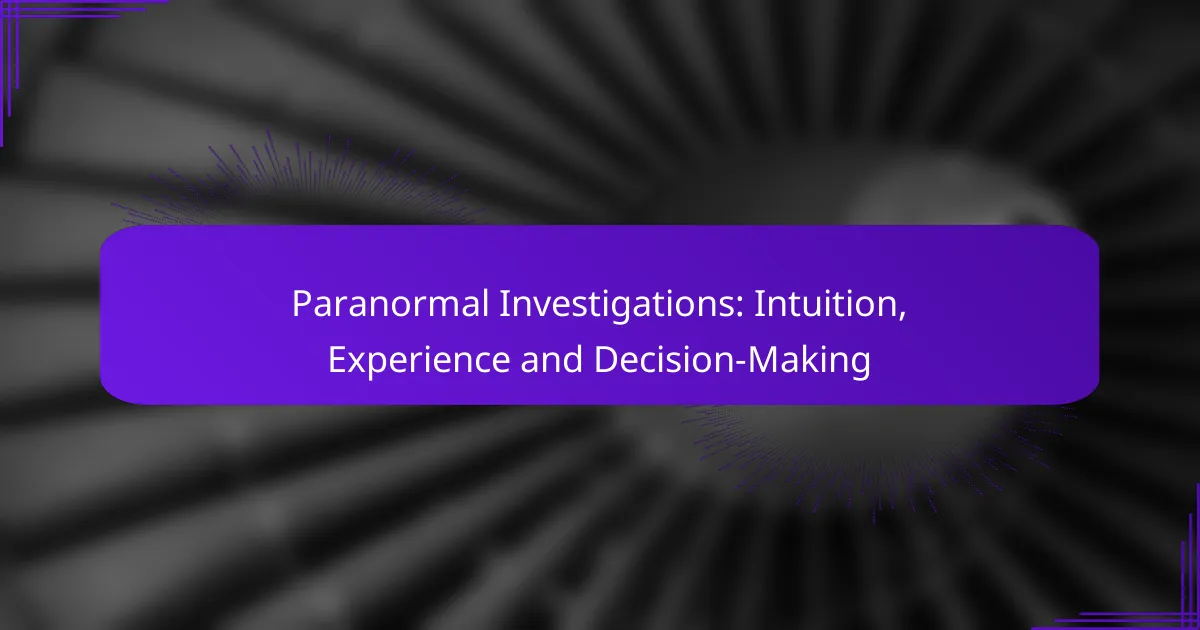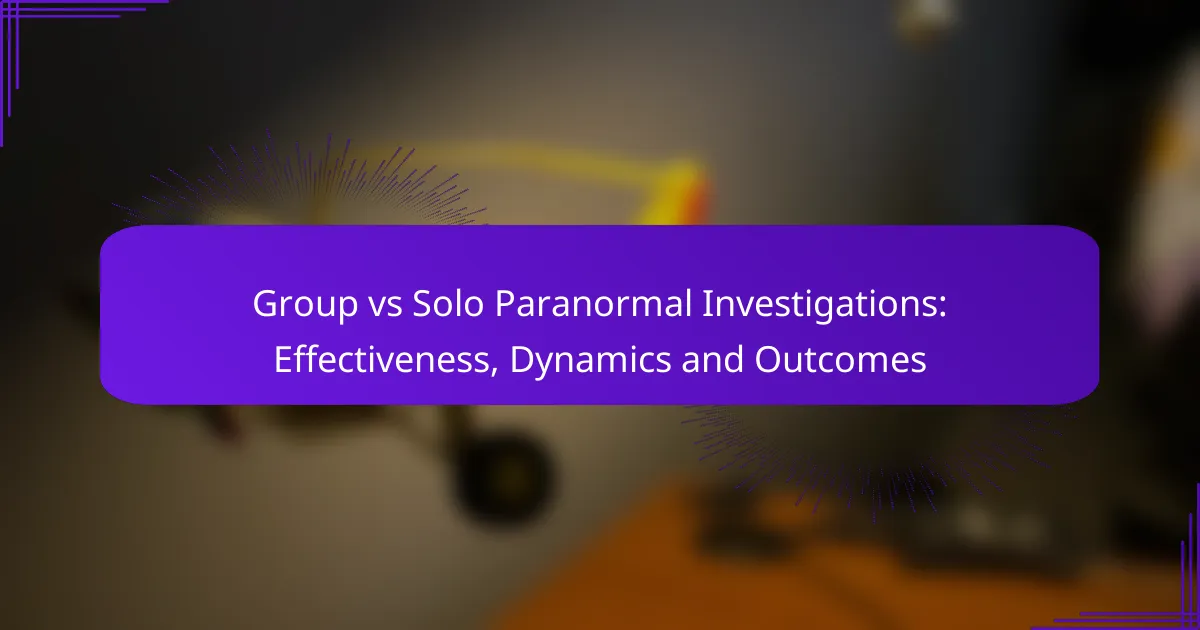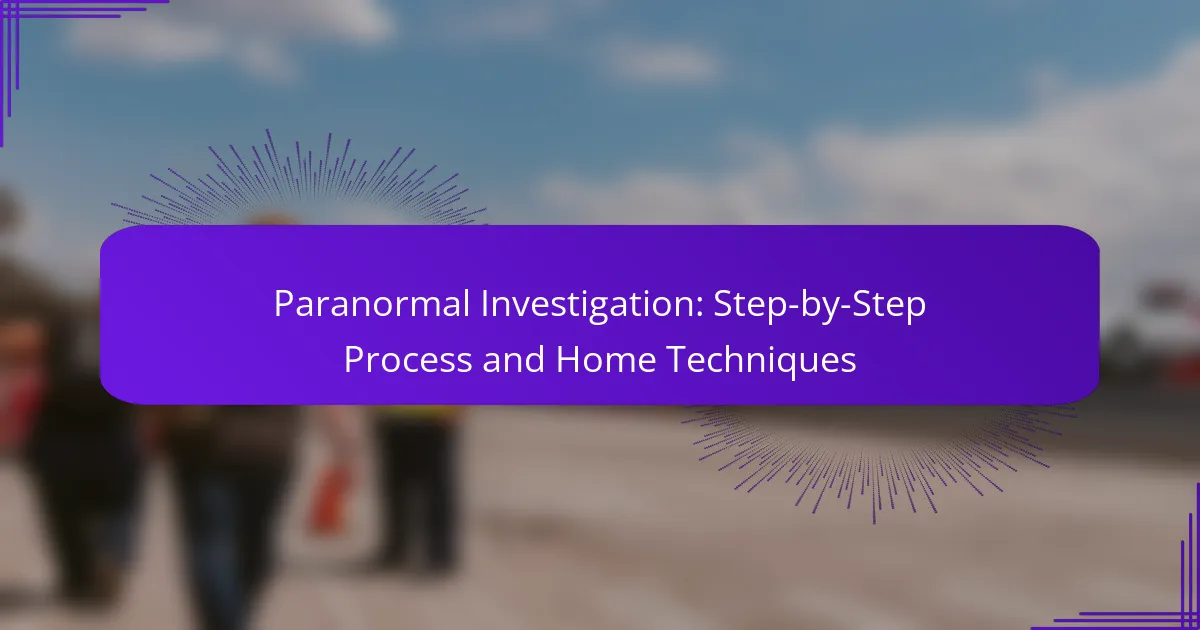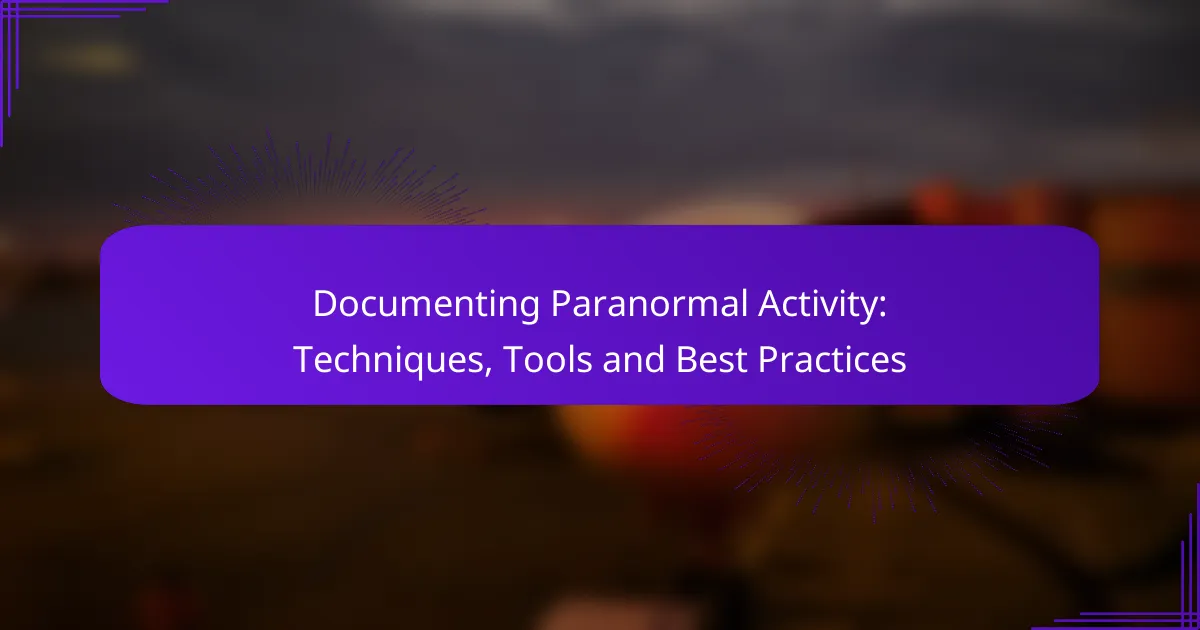Paranormal investigations require a unique blend of intuition, experience, and decision-making skills to navigate the complexities of unexplained phenomena. By enhancing one’s innate abilities and drawing on fieldwork experiences, investigators can develop a sharper perception of subtle energies. Additionally, mentorship and analysis of past outcomes play crucial roles in refining judgment and improving the overall investigative process.
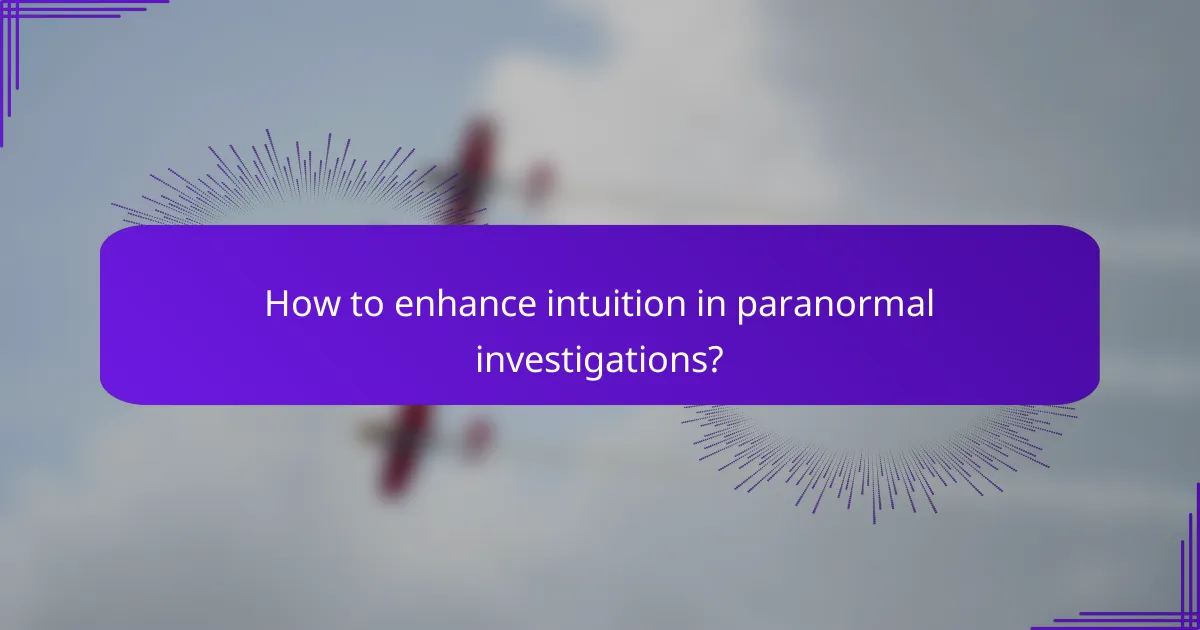
How to enhance intuition in paranormal investigations?
Enhancing intuition in paranormal investigations involves honing your innate abilities to perceive subtle energies and signals. This can be achieved through various practices that foster psychic sensitivity, mindfulness, and clarity of thought.
Developing psychic sensitivity
Developing psychic sensitivity requires a commitment to self-awareness and practice. Engage in activities that stimulate your intuition, such as journaling your experiences or keeping a dream diary. This helps in recognizing patterns and insights that may arise during investigations.
Consider participating in workshops or groups focused on psychic development, where you can share experiences and learn from others. Regularly practicing exercises like energy sensing or reading tarot can also enhance your sensitivity to paranormal phenomena.
Practicing mindfulness techniques
Mindfulness techniques are essential for staying present during paranormal investigations. Techniques such as deep breathing, body scanning, or focused meditation can help clear your mind and heighten your awareness of your surroundings.
Incorporate short mindfulness sessions before investigations to center yourself. This practice can improve your ability to discern between your thoughts and external energies, allowing for more accurate interpretations of the environment.
Utilizing meditation for clarity
Meditation is a powerful tool for achieving clarity in paranormal investigations. Regular meditation can help quiet the mind, making it easier to receive intuitive messages and insights. Aim for at least 10-20 minutes of meditation daily to build this skill.
Experiment with different types of meditation, such as guided visualizations or transcendental meditation, to find what resonates with you. Creating a calm and sacred space for your practice can enhance your ability to connect with intuitive insights during investigations.
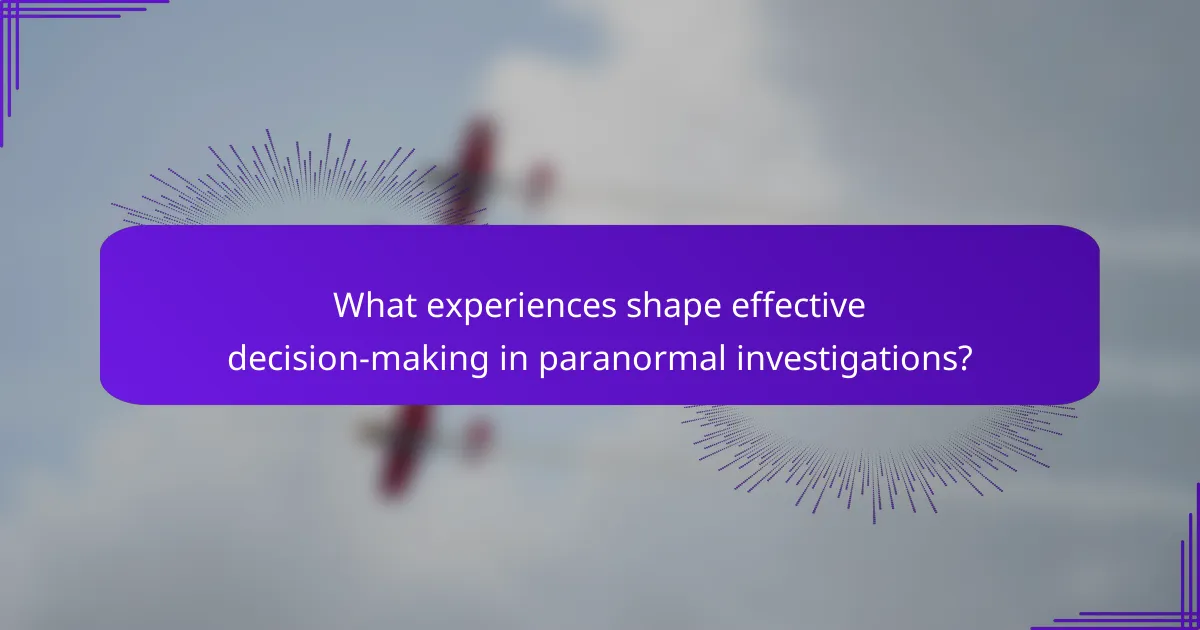
What experiences shape effective decision-making in paranormal investigations?
Effective decision-making in paranormal investigations is shaped by a combination of fieldwork experiences, mentorship from seasoned investigators, and analysis of past investigation outcomes. These elements help investigators develop intuition and refine their judgment in high-pressure situations.
Fieldwork case studies
Fieldwork case studies provide real-world examples that can significantly influence decision-making in paranormal investigations. By examining various cases, investigators can identify patterns, successful strategies, and common pitfalls. For instance, a case involving unexplained noises may lead to different conclusions based on environmental factors or prior experiences.
Investigators should document their findings and share them with peers to create a repository of knowledge. This collective experience can guide future investigations and enhance overall effectiveness.
Mentorship from seasoned investigators
Mentorship plays a crucial role in shaping decision-making skills in paranormal investigations. Learning from experienced investigators allows newcomers to gain insights into effective techniques and strategies. A mentor can provide guidance on assessing evidence, managing team dynamics, and navigating challenging situations.
Establishing a mentorship relationship can be as simple as joining local paranormal groups or attending workshops. Engaging with seasoned professionals fosters a supportive environment where knowledge and experiences are exchanged.
Analyzing past investigation outcomes
Analyzing past investigation outcomes is essential for refining decision-making processes. Investigators should review both successful and unsuccessful cases to understand what worked and what didn’t. This analysis can reveal critical insights into evidence interpretation and the importance of context.
Creating a checklist of key factors to consider during investigations, such as environmental conditions and team communication, can help streamline future decision-making. Regularly revisiting and updating these checklists based on past experiences ensures continuous improvement in investigative practices.
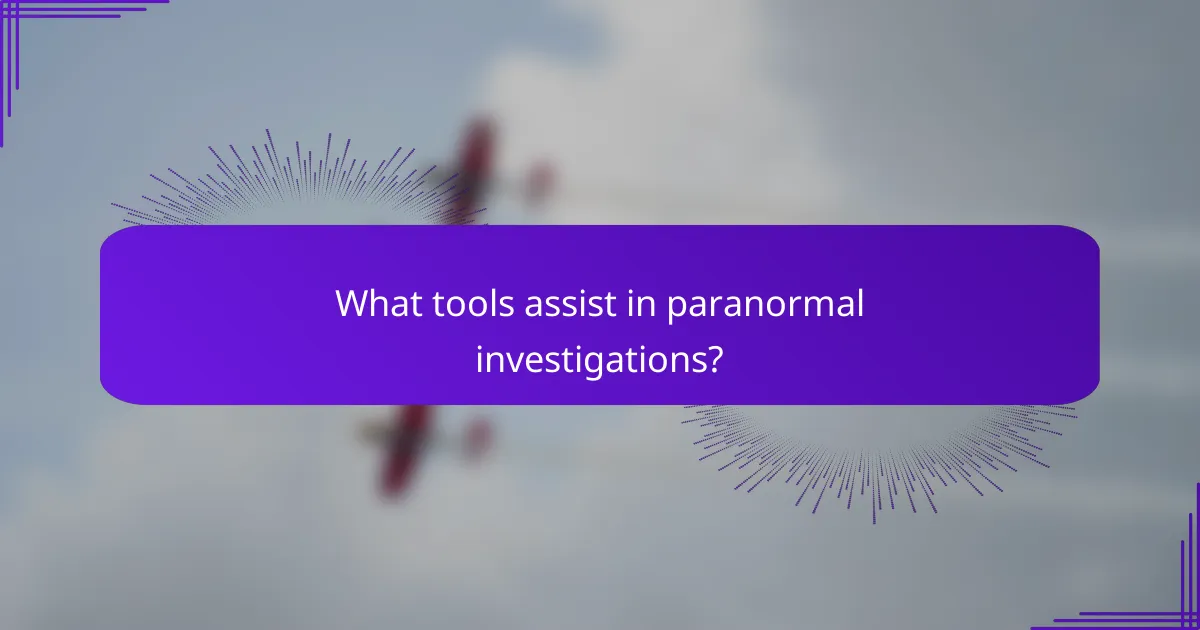
What tools assist in paranormal investigations?
Paranormal investigations utilize various tools to detect and document unexplained phenomena. These instruments help investigators gather evidence and enhance their understanding of potential paranormal activity.
EMF meters for energy detection
EMF meters measure electromagnetic fields, which are often thought to be associated with paranormal activity. These devices can detect fluctuations in energy levels, helping investigators identify areas of interest.
When using EMF meters, it’s crucial to understand that natural sources, such as electrical wiring or appliances, can cause spikes. Investigators should take baseline readings in a controlled environment to distinguish between natural and potentially paranormal fluctuations.
Digital voice recorders for EVP
Digital voice recorders are essential for capturing Electronic Voice Phenomena (EVP), which are unexplained voices or sounds that may occur during investigations. These devices allow for high-quality audio recordings, making it easier to analyze any anomalies later.
For effective EVP sessions, choose a quiet location and ask clear, direct questions. Review recordings in a soundproof environment to minimize interference from background noise, as this can help identify genuine phenomena.
Thermal imaging cameras for temperature changes
Thermal imaging cameras detect variations in heat, which can indicate the presence of entities or unexplained phenomena. These cameras visualize temperature differences, allowing investigators to spot cold spots or unusual heat signatures.
When using thermal cameras, it’s important to consider environmental factors, such as drafts or heat sources, that may affect readings. Conducting multiple scans and comparing results can help validate findings and rule out false positives.
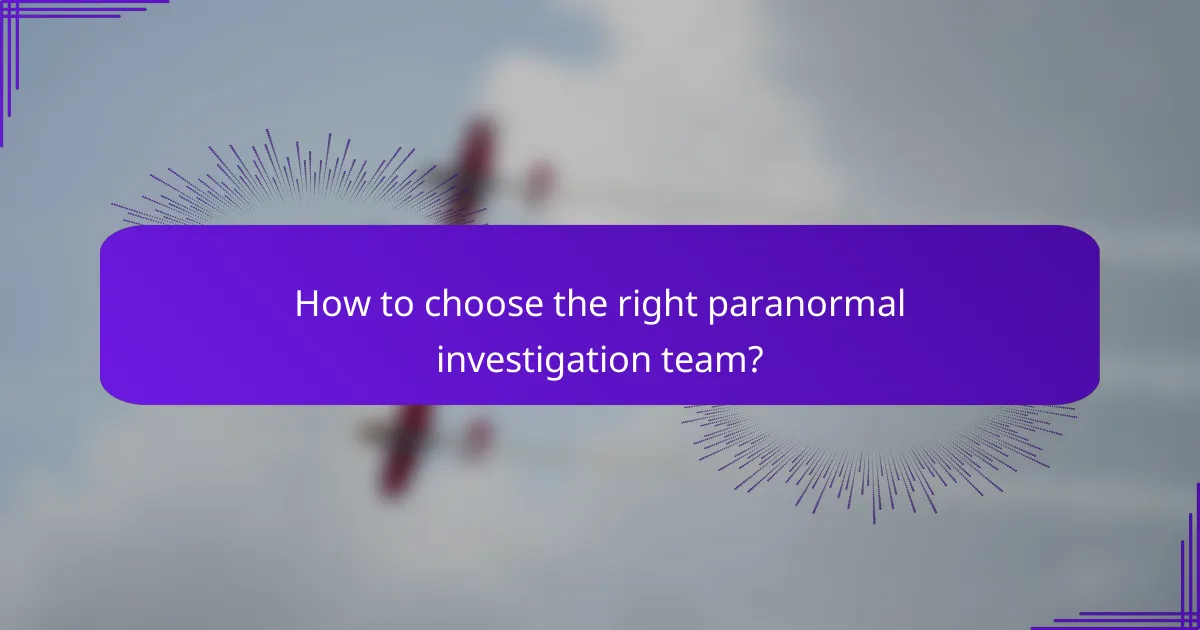
How to choose the right paranormal investigation team?
Choosing the right paranormal investigation team involves evaluating their experience, communication styles, and individual specialties. A well-rounded team can enhance the quality of investigations and ensure a thorough approach to the paranormal phenomena being studied.
Evaluating team members’ experience
Assessing the experience of team members is crucial for effective paranormal investigations. Look for individuals who have participated in multiple investigations, ideally with a variety of cases, as this breadth of experience can provide valuable insights and techniques.
Consider asking potential team members about their specific roles in past investigations and any training they have received. A mix of backgrounds, such as those with scientific training and those with intuitive skills, can create a balanced team capable of tackling different aspects of paranormal research.
Assessing team dynamics and communication
Strong team dynamics and effective communication are vital for a successful paranormal investigation. Observe how team members interact with one another during initial meetings or practice sessions; a collaborative atmosphere often leads to better decision-making and problem-solving.
Establish clear communication protocols for investigations, including how to share findings and discuss experiences. This can help prevent misunderstandings and ensure that all team members feel valued and heard, which is essential in high-stress situations.
Understanding individual specialties
Each team member may bring unique skills or specialties to the investigation, which can significantly enhance the team’s overall effectiveness. Identify what each member excels at, whether it’s technical skills like operating equipment, intuitive abilities, or knowledge of local folklore.
Encourage team members to share their specialties and how they can contribute to the investigation. This not only fosters collaboration but also allows the team to leverage diverse perspectives, leading to more comprehensive analyses of paranormal events.
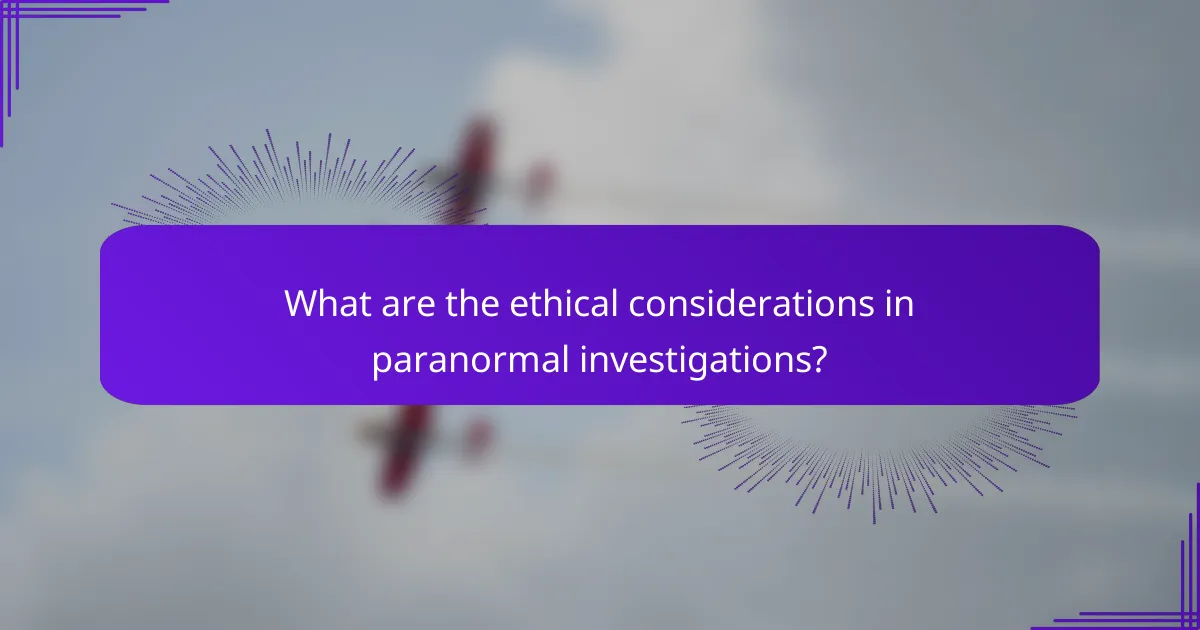
What are the ethical considerations in paranormal investigations?
Ethical considerations in paranormal investigations focus on respect for locations, informed consent from participants, and integrity in reporting findings. These principles ensure that investigations are conducted responsibly and with sensitivity to the people and places involved.
Respecting locations and their histories
Respecting locations and their histories is crucial in paranormal investigations. Investigators should research the background of the site, including its cultural and historical significance, to avoid disrespecting the memories or experiences associated with it.
For instance, when investigating a historical site, consider the events that took place there and how they may affect the local community. Engaging with local historians or community members can provide valuable insights and foster goodwill.
Informed consent from participants
Informed consent is essential when involving participants in paranormal investigations. This means clearly explaining the nature of the investigation, potential risks, and how their data will be used, ensuring participants are fully aware before agreeing to take part.
Always provide participants with the option to withdraw at any time without consequences. This practice not only respects their autonomy but also builds trust, which is vital for a successful investigation.
Maintaining integrity in reporting findings
Maintaining integrity in reporting findings is fundamental to the credibility of paranormal investigations. Investigators should document their methods and results accurately, avoiding exaggeration or misrepresentation of evidence.
When sharing findings, consider using clear, objective language and providing context for the evidence. This helps others understand the investigation’s scope and conclusions, fostering a more informed discussion about the results.
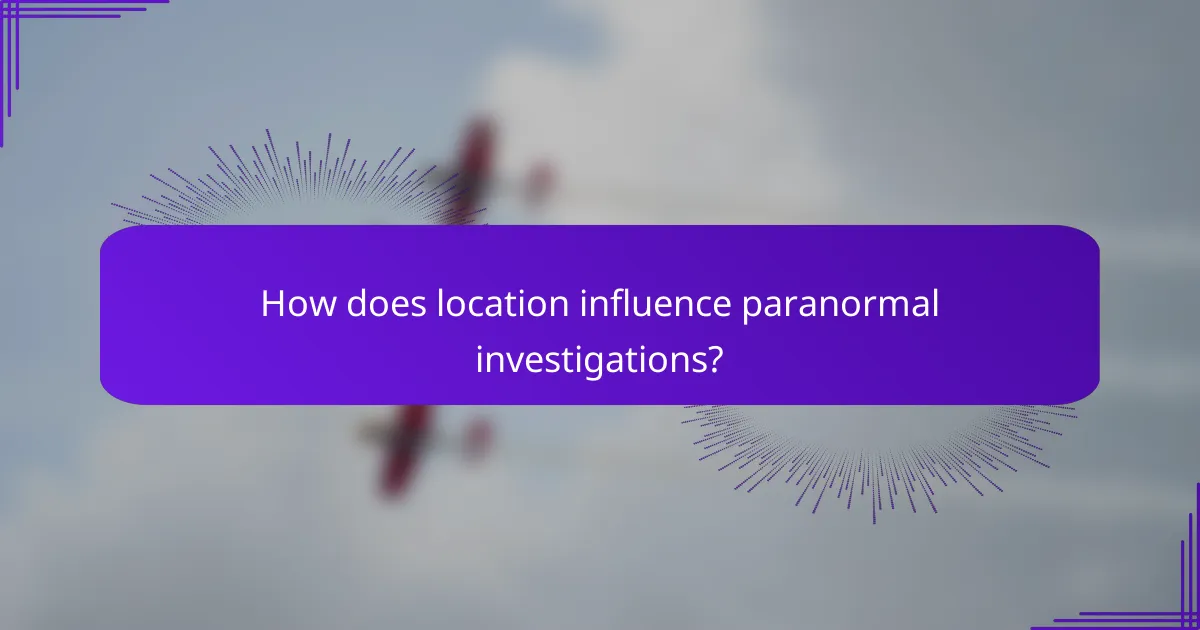
How does location influence paranormal investigations?
Location plays a crucial role in paranormal investigations, as it can significantly affect the energy and experiences encountered. Factors such as historical significance and geographical features can enhance or diminish the potential for paranormal activity.
Historical significance of sites
The historical significance of a site can greatly impact paranormal investigations. Locations with rich histories, such as battlefields, old hospitals, or abandoned asylums, often have stories of trauma or loss, which can create a heightened emotional energy. Investigators should research the background of a location to understand its past and any events that may contribute to its paranormal reputation.
When choosing a site, consider the narratives associated with it. A location with documented hauntings or local legends may provide more opportunities for encounters. Additionally, engaging with local historians or paranormal groups can yield insights into the site’s significance and previous investigations.
Geographical features affecting energy
Geographical features can influence the energy present in a location, impacting the outcomes of paranormal investigations. Natural elements such as water bodies, mountains, and ley lines can create unique energy fields that may enhance or disrupt paranormal activity. For instance, areas near water are often reported to have increased ghost sightings, possibly due to the energy water can hold.
Investigators should assess the landscape when planning their investigations. Features like caves or dense forests may create a different atmosphere compared to open fields. Understanding these geographical factors can help in selecting the best times and methods for conducting investigations, as well as in interpreting the results.
